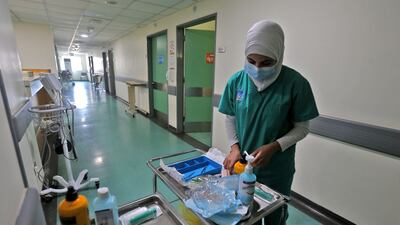One of Lebanon’s biggest hospitals said on Saturday that more than 230 patients on respirators would die if it is forced to shut down its operations due to fuel shortages.
The American University of Beirut Medical Centre is among several hospitals close to running out of diesel, which is needed to power private generators.
Shortages have intensified after the central bank’s decision to half its subsidies of fuel imports.
“AUBMC is facing imminent disaster due to the threat of a forced shutdown starting the morning of Monday August 16, as a result of fuel shortages,” the hospital said.
“Forty adult patients and 15 children living on respirators will die immediately; 180 people suffering from renal failure will die poisoned after a few days without dialysis.”
Earlier in the day, Firass Abiad, chief executive of Rafik Hariri University Hospital in Beirut, said only two of seven generators were running so the hospital could preserve fuel.
Fuel importers are set to resume deliveries to hospitals, bakeries and pharmaceutical companies after an agreement between the central bank and the Energy Ministry to subsidise existing stocks of fuel, the state-owned National News Agency reported.
Future imports will be financed at the market exchange rate, the central bank has said.
Earlier this week, it announced it will stop financing fuel imports at the subsidised 3,900 Lebanese pounds to the dollar rate to protect its dwindling currency reserves.
The fuel crisis led to extended power cuts and disruption in water supplies and the internet, with the state-owned power company only providing up to two hours of electricity a day across Lebanon.
Despite the worsening economic crisis, the worst to grip Lebanon in decades, the country remains without a functioning Cabinet since the deadly blast in Beirut in August 2020.

